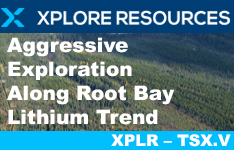Bion Environmental Technologies Inc. (BNET:OTCQB) announced its "pure" commercial 10-0-0 nitrogen fertilizer produced from livestock waste is now OMRI listed for use in organic production.
Bion's ammonium bicarbonate fertilizer is a stable source of nitrogen upcycled from reactive ammonia in organic waste streams in a patented process. OMRI is an international nonprofit organization that lists products allowed for use in organic production under the USDA's National Organic Program.
"This is a giant step in circular agriculture," said Turk Stovall, chief executive officer of Stovall Ranching Cos. who is leading a joint venture with Bion and sits on its board. "Bion's advanced manure management will help us close the gap in the nitrogen cycle, while promoting precision nutrient management, enabling water recycling in our finishing operations, and generating renewable energy production sufficient to power our entire operation."
According to Growing a Greener World, the numbers on fertilizer labels refer to percentages of nitrogen, phosphorous, and potassium.
Bion's Ammonia Recovery System (ARS) was developed to process and treat livestock waste streams with a focus on discharges from anaerobic digesters. It's at the core of the company's Gen3Tech technology, which produces renewable energy and clean water from livestock waste streams and removes the ammonia, then stabilizes and repurposes it into low-carbon and organic nitrogen fertilizers using only the compounds in the waste stream itself.
This keeps ammonia out of the air, land, and water and saves the resource from being lost. It can then be used as an organic fertilizer, adding significant value to help offset treatment costs, the company said.
"Bion will initially focus on several markets for its OMRI-listed fertilizers, including production of high-value specialty crop fruits and vegetables, organic corn side dressing, and hydroponic and greenhouse applications," the company said in a release. "Bion also expects demand in regions where nitrogen inputs are required to maximize the benefits of cover crops that store carbon and improve soil and microbial health. Further, Bion is also evaluating opportunities in regenerative practices that include fertilized pastures to graze cattle."
"Maximizing the value of these resources will allow us to both raise cattle and farm more efficiently," Stovall said. "We look forward to working with organic farmers to maximize the opportunities for organic production in Montana and elsewhere."
Pathogen Free
Bion said its approach will reduce the carbon footprint associated with organic systems and "significantly reduce nitrogen runoff and off-gassing to protect surface waters, aquifers, and the atmosphere. It can quickly bring soil microbes in organic systems back to a healthy and productive balance and reduce the yield gap of organic crops as compared to conventional."
An organic fertilizer, manure is traditionally applied to cropland before planting takes place. The volatile ammonia-nitrogen it contains — about 75% of the fertilizer's nitrogen/nutrient value — is usually lost to the environment. But Bion said its patented ARS technology targets this volatile and highly mobile ammonia nitrogen, stabilizes it with carbon dioxide also in the waste stream, and converts it into ammonium bicarbonate, a 100% soluble nitrogen fertilizer that can be readily absorbed by plants.
"The nitrogen fertilizer can now be transported and applied to organic crops," the company said. "It is pathogen free; so, unlike manure it can be applied at any time in the plant growth cycle through standard drip systems, field irrigation, soil injection, side dressing, and foliar spraying."
An OMRI listing enhances value and transparency for farmers, improves consumer confidence, and reduces Bion’s partners' exposure to claims of greenwashing.
The Catalyst: Desire for Environmentally Conscious Food
According to a report from Markets and Markets, the market size for organic fertilizers is valued at US$7.9 billion in 2024 and is estimated to increase at a compound annual growth rate (CAGR) of 11.5% through 2029 to reach US$13.6 billion.
"The rising preference for environmentally conscious food fuels the growth of the organic fertilizers industry," the report said. "This transition underscores a wider dedication to sustainable farming methods and reducing ecological damage."
Governments around the world are responding to this shift by enacting regulations and incentives to encourage organic farming, Markets and Markets said.
"These actions aim to facilitate the transition to organic methods, further boosting the demand for organic fertilizers," the report said.
Vantage Market Research said the market could grow to as much as US$24.95 billion by 2030. "Organic fertilizers, derived from natural sources, offer numerous benefits including improved soil fertility, enhanced crop yield, and reduced environmental impact," its analysts noted.
Producing Sustainable Beef at Scale
With its Gen3Tech, the company said it will lead the charge to produce truly sustainable beef at scale within the next two years.
The vast majority of U.S. beef is "finished" at outdoor feed yards, where the cattle are grain-fed. Bion’s technology treats waste from indoor finishing facilities, where cattle are protected from the elements and their waste can now be collected and treated. This reduces pollution while improving economics by upcycling the waste into valuable fertilizer products, clean water, and renewable energy. Cattle feeders and producers can also create more value for their commodity through premium pricing by having a sustainable brand that would be backed up by Bion's technology and third-party verification, the company noted.
Stovall is a fifth-generation Monta rancher and owner of Stovall Ranching and Yellowstone Cattle Feeders. In June, Bion announced it was partnering with Stovall Ranching to develop a new generation of cattle feeding facility.
The partnership plans to construct a 15,000-head capacity facility at Stovall's Yellowstone Cattle Feeders in Shepherd, Montana. Cattle will be finished in barns designed for feed efficiencies and cattle welfare while being outfitted with solar generation and advanced waste treatment and resource recovery systems provided by Bion's patented closed-loop technologies.
 Streetwise Ownership Overview*
Streetwise Ownership Overview*
Bion Environmental Technologies Inc. (BNET:OTCQB)
"We aren't focused on how beef was produced over the last 50 years; we are focused on how to produce it for the next 50 years," Stovall has said. "Once completed and proven, the facility can serve as a model to execute in other states and other possible locations in Montana."
There are about three times as many beef cattle in the U.S. as dairy cattle. However, there are only a handful of digesters at beef feedyards, because outdoor feedlots and their production practices don't work with a digester. Bion said its Gen3Tech system resolves those issues and opens up the larger beef industry (also with larger scale facilities) for digesters and clean fuels production.
Ownership and Share Structure
According to Reuters, about 23.46% of Bion Environmental is owned by management and insiders.
About 1.25% is with Centerpoint Corp. with 0.70 million shares. Less than 1% is held by institutions. The rest is with retail.
Bion has a market cap of US$12.44 million. Trading over the past 52 weeks ranged from US$0.15 per share to US$1.30.
| Want to be the first to know about interesting Agriculture and Technology investment ideas? Sign up to receive the FREE Streetwise Reports' newsletter. | Subscribe |
Important Disclosures:
- Bion Environmental Technologies Inc. has a consulting relationship with Street Smart an affiliate of Streetwise Reports. Street Smart Clients pay a monthly consulting fee between US$8,000 and US$20,000.
- As of the date of this article, officers and/or employees of Streetwise Reports LLC (including members of their household) own securities of Bion Environmental Technologies Inc.
- Steve Sobek wrote this article for Streetwise Reports LLC and provides services to Streetwise Reports as an employee.
- This article does not constitute investment advice and is not a solicitation for any investment. Streetwise Reports does not render general or specific investment advice and the information on Streetwise Reports should not be considered a recommendation to buy or sell any security. Each reader is encouraged to consult with his or her personal financial adviser and perform their own comprehensive investment research. By opening this page, each reader accepts and agrees to Streetwise Reports' terms of use and full legal disclaimer. Streetwise Reports does not endorse or recommend the business, products, services or securities of any company.
For additional disclosures, please click here.









































